Theater and the Novel, Part II: Charlotte Brontë, Performance, and Plays-Within-Books
When theater features within the novel
Last week, we talked about the historical influence of theater on the novel, from Aristotle’s principles, to 19th century social life. This week we’re tackling the two forms from a different angle: when theater features within a novel.
Our last two books for Season 5 of The Novel Tea podcast, Adaptations, are Home Fire and All’s Well. One is a retelling of a Greek tragedy, and the other incorporates various elements from two (or three) Shakespeare plays. We thought this would be the perfect time to talk about how plays and novels have influenced each other over the years.
As we discussed last week, in the 19th century, the novel started to rise in popularity in England over the theater, despite there being a plethora of written works around the theater (the play itself, the playbill, etc).
The novel had a significant advantage over a written play or playbill in one unique way: it could feature not only the story, characters, and themes (as in the play), but it could also capture the physical experience of playgoing: the social encounters, the physicality of crowds and bodies in the boxes and the lobbies, and the allure of the stage performers.
Charlotte Brontë wrote vividly about this experience in her final novel.
Charlotte Brontë and a Revelation of Terror
In 1851, Charlotte Brontë visited London and saw the great French actress Rachel Felix performing the tragedy Adrienne Lecouvrer on stage. Though Brontë was no great lover of the theater, she was greatly moved by what she saw:
“On Saturday, I went to hear and see Rachel-a wonderful sight-terrible as if the earth had cracked deep at your feet and revealed a glimpse of hell-I shall never forget it-she made me shudder to the marrow of my bones: in her some fiend has certainly taken up an incarnate home. She is not a woman-she is a snake-she is the…”
— The Letters of Charlotte Brontë
She was so overcome by the experience that she left off mid-sentence, unable to find the words to complete the thought. And clearly, this experience left a lasting impression, because it was later incorporated into her novel Villette.
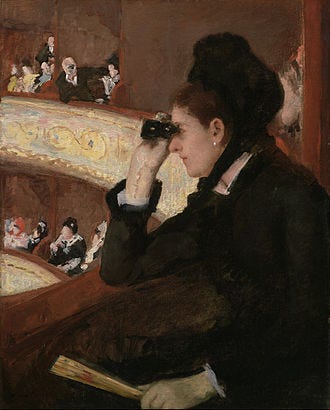
When its heroine, Lucy Snowe, attends the theater to see the famous Vashti (likely a fictionalized version of Rachel), she describes what she sees with a revelation of terror.
“For a while-a long while-I thought it was only a woman, though a unique woman, who moved in might and grace before this multitude. By-and-by I recognized my mistake. Behold! I found upon her something neither of woman nor of man: in each of her eyes sat a devil. These evil forces bore her through the tragedy, kept up her feeble strength-for she was but a frail creature; and as the action rose and the stir deepened, how wildly they shook her with their passions of the pit!”
— Villette, Charlotte Brontë
As Matthew Richard Skwiat argues in “The Realist Stage: Theatrical Verisimilitude in the Nineteeth Century Novel,” the inclusion within a novel (which is itself a kind of performance) of a secondary performance, and subsequent analysis of that performance complicates the experience of reading the novel.
“Vashti’s body,” Skwiat says, “becomes a site of reading and performance, a character that affectively controls the emotions and even actions of her audience, yet one who is at the same time being written and made sense of by her audience/readers.”
Plays Within Novels: To What Effect?
As in the example of Villette, plays within novels make us aware of the idea of performance, physicality, and voyeurism. Who is performing? Who is watching the performance? And where does that position us, as readers of the novel?
The play within the novel can, in this and other ways, add dimension to characters. Their struggles on and off the stage to understand the roles they are playing somehow lets us in on their self-constructions.
This is not necessarily a new tradition: in Hamlet, we get a play-within-a-play. The young prince is attempting to elicit a reaction from his uncle that might confirm or deny his suspicions about Claudius’ role in his father’s death. The play’s plot mirrors the plot of Hamlet itself, causing us to question the ways we perform certain roles, and the nature of reality.
And, in this way, theatrical devices in novels can often make both narrator and reader aware of the book’s fictional construction, rendering the novel as a form more self-aware.
Books that Center Theater and Performance
The Rehearsal by Eleanor Catton
The Rehearsal, Eleanor Catton’s first novel, follows a myriad of characters in the aftermath of an affair between music teacher Mr. Saladin and one of his female students. We learn not only about the characters at the girl’s high school, and those taking music lessons, but we also spend time at the Drama Institute, where this very scandal has been co-opted by the students for a theater production.
The mirroring of the real-life scandal and the theatrical production cast’s everyone’s roles in a suspicious light — who is being authentic? Who was really harmed by this affair?
While this novel reads more like an experiment in form than a full-fledged novel, I appreciated the questions and themes that Catton was exploring, which I wrote about more in this guest essay on
’s publication .All’s Well by Mona Awad
I won’t say too much about this book here because we discussed it in depth in our latest episode of The Novel Tea. But in brief, it is the story of Miranda Finch, a professor of drama at a local college, who is in constant, severely debilitating chronic pain after a stage accident years ago. She is in charge of directing the seasonal school production, but while she wants to produce All’s Well That Ends Well, the students are insistent on MacBeth.
After being dismissed by her students, friends, and countless medical professionals, Miranda encounters something strange — a way out of her predicament. As the novel progresses, we get caught up in the staging of the play, in the way that characters start to embody the roles they are playing, and how the magic of the stage might actually hold sinister implications.
Enter Ghost by Isabella Hammad
Enter Ghost was my top read of 2024. It follows Sonia, a British-Palestinian woman who visits her sister in Haifa for the summer and gets pulled into an amateur production of Hamlet. As the ghost of Hamlet looms over Hamlet, the ghosts of Sonia’s past loom over her life: past romantic relationships, a tumultuous acting career, and her family’s fractured familial bonds.
Hammad is drawn to the idea of recognition (what Aristotle termed as anagnorisis) — how does Hamlet’s inability to relate to his own past affect the characters of the story? We wrote much more about this book here and here — and given how much I loved this book, I’m quite sure it’ll come up again.
Mansfield Park by Jane Austen
An essay about novels and the theater would not be complete without reference to Mansfield Park. This book, which follows poor young Fanny who is sent to live with her wealthy relatives at Mansfield Park, features, quite prominently, a subplot involving an amateur theater production. The estate’s young men and women, starved for entertainment, decide to practice and stage a private production of August von Kotzebue’s “Lover’s Vows,” a racy romantic drama about illegitimacy and sexual desire.
Until now, I had always thought about this play from the perspective of timid, party-pooper Fanny, and the way that it exposes immorality in some of the characters. But now, as I think through what I’ve learned about plays-within-novels, I’m realizing that this play also does so much to bring up the question of performance and the roles we play in society and within/across class.
I am long overdue for a Mansfield Park re-read, and I’m excited to get back to it with these new questions in mind.
The Age of Innocence by Edith Wharton
I am stretching the definition of ‘theater’ here, but I had to include this book that I love. Opera and performance play incredibly important roles in The Age of Innocence, Edith Wharton’s Pulitzer-winning novel that follows Newland Archer as he grapples with his feelings for two women, and his precarious position in a changing world.
The way we perform ourselves to other people, or to the world, is at the crux of this novel — and its opening line announces that to the reader:
“On a January evening of the early seventies, Christine Nilsson was singing Faust at the Academy of Music in New York.”
What I find brilliant about Wharton’s writing is the way she manages to convey the hypocrisy of these people’s lives, while also communicating just how impossible it is for them to remove themselves from the artifice that they all feel compelled to perform. If you’d like a nerdy deep dive, I enjoyed this article on Jstor that looks at performance and artifice, and how opera brings these themes to light.
(Also, Martin Scorsese’s movie adaptation of this novel is gorgeous.)
Station Eleven by Emily St. John Mandel
Station Eleven is a pandemic novel that follows several characters after the largescale society. It opens with a performance of King Lear, and throughout the rest of the novel, we spend time with Kirsten and the Traveling Symphony, as they roam about a vast, post-apocalyptic landscape, and perform Shakespeare plays for anyone who will watch.
This novel, in contrast to many of the others on this list, is not as concerned with the artificiality and performance aspect of theater, but rather, its communal aspect. It wants to bring theater to life, to demonstrate its power in bringing people together (much like how going to the theater would be a grand social event in the 19th century).
Last year on the podcast we discussed The Sea of Tranquility, also written by Mandel, and we loved how she was able to weave together the lives of so many different people, and explore the idea of a collective humanity. Station Eleven does that at an extreme, and offers hope in a bleak world.
If We Were Villains by M.L. Rio
I will start by saying this: you may have heard this book compared to The Secret History. Do not read If We Were Villains with The Secret History in mind — if you do, you will be disappointed. I know, because this is what happened to me.
If We Were Villains begins with Oliver Marks being released from jail. He was convicted of a murder that happened a decade ago at Dellecher Classical Conservatory, a small liberal arts school. We go back in time and learn about the intricacies of his relationships with seven other Shakespeare actors, their romances, their fights, their jealousies, and their secrets.
This novel bends YA in its tone, but it still plays (ha! pun not intended) with the idea of theatrical roles — hero, villain, tyrant, temptress — and how the students begin to embody these roles in their real lives, until very quickly, life begins to imitate art, and they are faced with a real-life tragedy.
If We Were Villains asks what happens when we allow the intoxicating allure of theater to consume us, and explores the potential of art to hold power and corrupt. Read more about the play’s theater connections and historical references here at the Folger Library.
What do you think of these books? What books do you love that feature the theater?
— Shruti
References:
The Realist Stage: Theatrical Verisimilitude in the Nineteenth Century Novel. Skwiat, Matthew Richard. University of Rochester ProQuest Dissertations & Theses, 2022. 29321912.
Russell, Gillian. “Chapter 28: The Novel and the Stage.” The Oxford History of the Novel in English, vol. 2, Oxford University Press, 2015, pp. 513–531.
More About the Theater:
Gatekeeping Around Shakespeare with Farah Karim-Cooper on The Stacks Podcast by
The Revolutionary Power of Palestinian Theater by Isabella Hammad [Lithub]
What's the Best Reading Order for Greek Tragedies? by
on
Latest on The Novel Tea
Today on the podcast we’re discussing All’s Well by Mona Awad. If you’ve read this book, you’re going to want to hear our discussion! And if not — listen in to see if this could be your next great read.
In case you missed them, here are some recent and related posts you might like to read next:





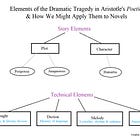
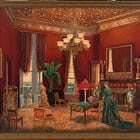
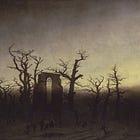


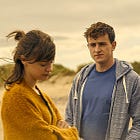
Thank you for including our episode. This was so interesting.